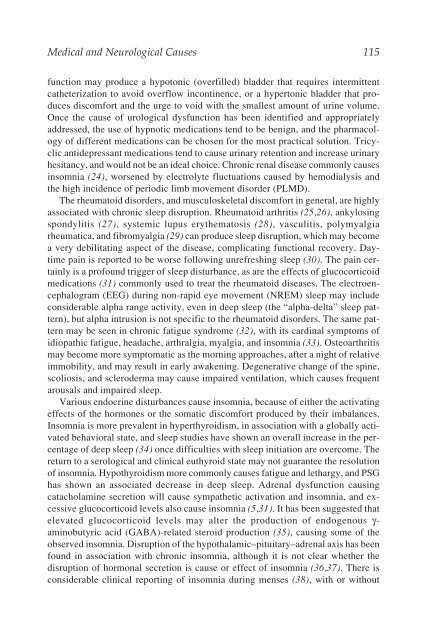Insomnia Insomnia
Insomnia Insomnia
Insomnia Insomnia
You also want an ePaper? Increase the reach of your titles
YUMPU automatically turns print PDFs into web optimized ePapers that Google loves.
Medical and Neurological Causes 115<br />
function may produce a hypotonic (overfilled) bladder that requires intermittent<br />
catheterization to avoid overflow incontinence, or a hypertonic bladder that produces<br />
discomfort and the urge to void with the smallest amount of urine volume.<br />
Once the cause of urological dysfunction has been identified and appropriately<br />
addressed, the use of hypnotic medications tend to be benign, and the pharmacology<br />
of different medications can be chosen for the most practical solution. Tricyclic<br />
antidepressant medications tend to cause urinary retention and increase urinary<br />
hesitancy, and would not be an ideal choice. Chronic renal disease commonly causes<br />
insomnia (24), worsened by electrolyte fluctuations caused by hemodialysis and<br />
the high incidence of periodic limb movement disorder (PLMD).<br />
The rheumatoid disorders, and musculoskeletal discomfort in general, are highly<br />
associated with chronic sleep disruption. Rheumatoid arthritis (25,26), ankylosing<br />
spondylitis (27), systemic lupus erythematosis (28), vasculitis, polymyalgia<br />
rheumatica, and fibromyalgia (29) can produce sleep disruption, which may become<br />
a very debilitating aspect of the disease, complicating functional recovery. Daytime<br />
pain is reported to be worse following unrefreshing sleep (30). The pain certainly<br />
is a profound trigger of sleep disturbance, as are the effects of glucocorticoid<br />
medications (31) commonly used to treat the rheumatoid diseases. The electroencephalogram<br />
(EEG) during non-rapid eye movement (NREM) sleep may include<br />
considerable alpha range activity, even in deep sleep (the “alpha-delta” sleep pattern),<br />
but alpha intrusion is not specific to the rheumatoid disorders. The same pattern<br />
may be seen in chronic fatigue syndrome (32), with its cardinal symptoms of<br />
idiopathic fatigue, headache, arthralgia, myalgia, and insomnia (33). Osteoarthritis<br />
may become more symptomatic as the morning approaches, after a night of relative<br />
immobility, and may result in early awakening. Degenerative change of the spine,<br />
scoliosis, and scleroderma may cause impaired ventilation, which causes frequent<br />
arousals and impaired sleep.<br />
Various endocrine disturbances cause insomnia, because of either the activating<br />
effects of the hormones or the somatic discomfort produced by their imbalances.<br />
<strong>Insomnia</strong> is more prevalent in hyperthyroidism, in association with a globally activated<br />
behavioral state, and sleep studies have shown an overall increase in the percentage<br />
of deep sleep (34) once difficulties with sleep initiation are overcome. The<br />
return to a serological and clinical euthyroid state may not guarantee the resolution<br />
of insomnia. Hypothyroidism more commonly causes fatigue and lethargy, and PSG<br />
has shown an associated decrease in deep sleep. Adrenal dysfunction causing<br />
catacholamine secretion will cause sympathetic activation and insomnia, and excessive<br />
glucocorticoid levels also cause insomnia (5,31). It has been suggested that<br />
elevated glucocorticoid levels may alter the production of endogenous γaminobutyric<br />
acid (GABA)-related steroid production (35), causing some of the<br />
observed insomnia. Disruption of the hypothalamic–pituitary–adrenal axis has been<br />
found in association with chronic insomnia, although it is not clear whether the<br />
disruption of hormonal secretion is cause or effect of insomnia (36,37). There is<br />
considerable clinical reporting of insomnia during menses (38), with or without


